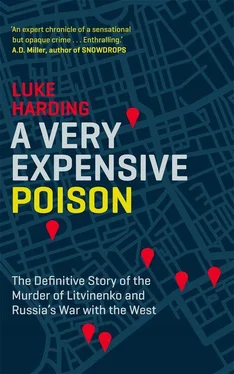Berezovsky said he’d been ‘inspired to write this letter by the pressing issues of national security’. He mentioned his ‘good long-term relations’ with the FSB chief, whom he commended for ‘honesty and professionalism’. Berezovsky then explained how he had learned of the plot to kill him – and how Litvinenko and the four other whistleblowers had written up a report for the presidential administration. The investigation into the plot had gone nowhere, though, Berezovsky complained. He urged Putin to pursue the matter and to secure ‘the constitutional order’.
Four days later, the stakes were elevated further when Litvinenko and his URPO colleagues staged an extraordinary press conference at the Interfax news agency in Moscow. They were to do something no FSB officers had done before: publicly to accuse their superiors of grievous crimes. Litvinenko, the main actor, sat in the middle. He did most of the talking. He made no attempt to hide his identity.
His companions were more bashful. One, Viktor Shebalin, wore a ski-mask; three others, Ponkin, Shcheglov and Latyshonok, put on dark shades. They looked like off-duty bank robbers. Only one other participant was unmasked: Trepashkin, the former FSB officer who had raised his own complaint against the agency. He was one of the men whom Litvinenko had been ordered to beat up.
Litvinenko told the journalists he was holding a press conference to draw the attention of Russia’s leadership and parliament to abuses going on inside the FSB. He said that he and his subordinates had received illegal instructions to kill and kidnap people and to extort money. Instead of protecting the state, senior FSB officials were busy lining their pockets.
Asked if he was scared, Litvinenko said he perfectly understood there would be retribution. ‘I know the habits of this organisation and therefore suspect that we shall all be strangled like blind puppies,’ he replied, adding that ‘as a citizen’ he considered it his duty to act. He said the plot against Berezovsky demonstrated that there was ‘anti-semitism’ in Russia at the very top. It was clear, he said, he was being hounded for his opinion that ‘nationalism is evil’.
The press conference was a sensation, massively reported on Russian TV and in print. Soon afterwards, in December, Putin gave an interview to the journalist Elena Tregubova at his office in the Lubyanka. Putin said he could understand why Berezovsky was alarmed – after all, Berezovsky had survived one assassination attempt. However, Putin took a dim view of Litvinenko’s actions. He told Tregubova: ‘FSB officers should not stage press conferences and should not expose internal scandals to the public.’
In January 1999, Putin fired Litvinenko, personally signing an order kicking him out. Putin also disbanded his unit. ‘Sasha knew it [the press conference] was a very extraordinary event, that the FSB will not take it so easy,’ Marina Litvinenko said. Her husband had told her, in darkly humorous tones, that one of two things would now happen to him.
‘They will kill me or I will be arrested,’ he predicted.
He was right: on 25 March 1999, Litvinenko was arrested. Four men dressed in civilian clothes grabbed him near Moscow’s Rossiya hotel, shouting: ‘FSB, you’re under arrest!’ They bundled him into the back of a van and started beating him with fists on his back.
After being interrogated by a military prosecutor, Litvinenko was hauled off to Lefortovo Prison. This is a drab, yellow three-storey Moscow building lined with spiraling razor wire. I would later visit it myself under unpropitious circumstances.
Lefortovo was the KGB’s most notorious jail. Its former inmates included ‘enemies of the state’ during both the Stalinist and late Soviet periods. One was the writer Yevgenia Ginzburg, who was held there before being transported to Siberia. Another was the Soviet dissenter Vladimir Bukovsky, who would become Litvinenko’s friend and guru. Alexander Solzhenitsyn, the Nobel Prize-winning novelist and dissident, wrote about Lefortovo in The Gulag Archipelago.
The FSB uses Lefortovo for its highest-profile cases. One wing serves as the FSB’s investigative department. There are a series of upstairs suites – small, boxy rooms where FSB officers in olive-green uniforms interview suspects; downstairs a K-shaped prison. On arrival, Litvinenko was stripped, searched and dumped in a solitary cell. He immediately began a hunger strike. The prison governor persuaded him to abandon it. Litvinenko would spend the next eight months in Lefortovo, including thirty-six days in solitary confinement.
Litvinenko was charged with abusing his position and beating up a suspect. According to Marina Litvinenko, the military prosecutor in charge of his case, Vladimir Barsukov, told her that Litvinenko’s real crime was to have gone public with his complaint against the FSB. Now he had to be punished. Barsukov added that if Litvinenko were acquitted, he would simply open another case against him. And, if necessary, ‘another and another’. The goal was to lock Litvinenko away.
Barsukov was telling the truth. Litvinenko denied the charges against him and in November 1999 a judge at the Moscow garrison military court found him not guilty. Court officials removed his handcuffs. Immediately a group of masked FSB officers burst into the room and re-arrested him. It was an ambush. This time Litvinenko was transferred to Butyrka, a Moscow prison controlled and administered by the federal penitentiary service. He spent the next twenty-four hours in solitary, in a tiny shoe-box-like cell, without food, water or sanitation. The cell was so small he could only stand or sit.
Inside Butyrka a group of unknown people summoned Litvinenko twice. They asked what he knew about Putin, urged him to confess, and said frankly: ‘You realise, of course, you can be poisoned here and we cannot really help you?’
Even by the standards of Russian justice, the new charge against him was ridiculous: he was accused of stealing from a vegetable warehouse. Litvinenko complained via his attorneys that the charge was fabricated, and in December he was released on bail. It was clear, though, that the FSB had no intention of giving up. In April 2000, military prosecutors dropped this charge and came up with another more serious one – stealing explosives and ammunition.
By this point, Litvinenko was running out of options. This new case would be heard in Yaroslavl, 170 miles (270 km) outside Moscow, and far away from public scrutiny. The hearing would be closed. A verdict had already been decided, Litvinenko was told – eight years at a labour camp in Nizhny Tagil, a city in the Urals.
The political situation had changed too. The previous week Russia had elected a new president, the country’s second post-communist leader. Yeltsin was gone. A new era was beginning. There had been, in effect, only one candidate to succeed Yeltsin. This was Putin. He had been doing the job on an acting basis for the previous three months, since January.
If he stayed in Russia Litvinenko would go to jail for a very long time. Probably, he would never emerge. That left only one other possibility. Escape.
2
Journalist, Exile, Campaigner, Spy
London, 2000–2006
‘Do you feel yourself safe, secure in Britain? Come on! Remember Trotsky’
FSB OFFICER ANDREI PONKIN TO LITVINENKO, SPRING 2002
It was late September 2000 when the figure – sandy hair, sporting appearance, no obvious luggage – slipped out of his Moscow apartment. From here he travelled to Sheremetyevo Airport and boarded an internal flight. Was anyone tailing him? The plane flew south and landed two hours or so later in Sochi on the Black Sea. This was southern Russia: warm, subtropical, hedonistic.
Читать дальше












